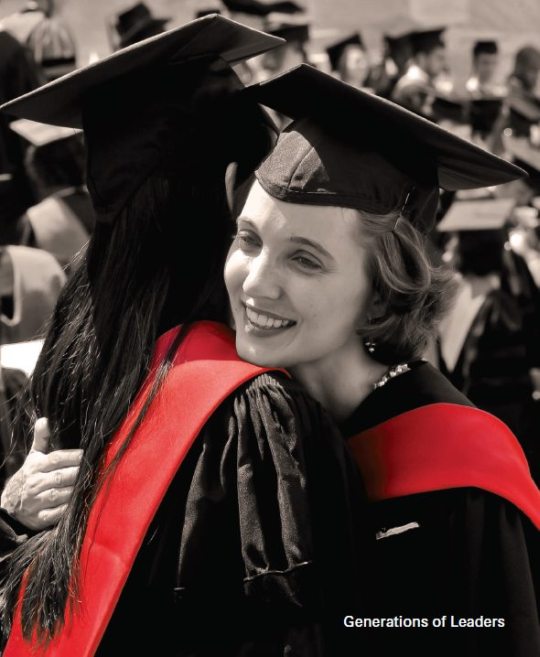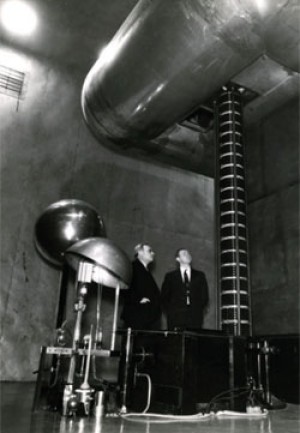Harvard Medical School. Generations of Leaders.
Sections for Harvard University
- About Harvard University.
- About Harvard University. Information.
- Harvard Medical School. Fact & Figures.
- Harvard Medical School. Generations of Leaders.
- Harvard School of Public Health (HSPH).
- Harvard School of Public Health (HSPH). History of the School.
- The Forum at Harvard School of Public Health
Harvard University. Harvard Medical School. Generations of Leaders.
Driving Change.
Building Momentum.
Making History.
Since 1782,
Harvard Medical School
has been the incubator
of bold ideas—a place where
extraordinary people advance education,
science and health care with unrelenting
passion.
Jeffrey S. Flier, MD. Bio.
Dean of the Faculty of Medicine
Harvard University
Jeffrey S. Flier was named the 21st dean of the Faculty of Medicine at Harvard University on July11, 2007. An endocrinologist and an authority on the molecular causes of obesity and diabetes, Flier is also the Carolyn Shields Walker professor of medicine at Harvard Medical School. Previously, he served as the HMS faculty dean for academic programs and chief academic officer for Beth Israel Deaconess Medical Center, an HMS-affiliated teaching hospital.
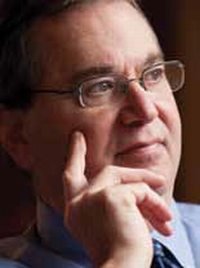
Flier is one of the country’s leading investigators in the areas of obesity and diabetes. His research has produced major insights into the molecular mechanism of insulin action, the mechanisms of insulin resistance in human disease, and the molecular pathophysiology of obesity.
Born in New York City, Flier received a BS from City College of New York in 1968 and an MD from Mount Sinai School of Medicine in 1972, graduating with the Elster Award for Highest Academic Standing. Following residency training in internal medicine at Mount Sinai Hospital from 1972 to 1974, he moved to the National Institutes of Health as a clinical associate. In 1978, he joined the Faculty of Medicine at HMS, serving as chief of the Diabetes Unit at Beth Israel Hospital until 1990, when he was named chief of the hospital’s Endocrine Division.
In 2002, Flier was named chief academic officer of Beth Israel Deaconess Medical Center, a newly created senior position responsible for research and academic programs. He worked with the center’s academic department chairs to ensure the quality and breadth of academic programs, through which most HMS students passed. He also served as the formal liaison to HMS, sitting on the Council of Academic Deans.
Flier has authored more than 200 scholarly papers and reviews and has held a variety of editorial positions. He is a fellow of the Institute of Medicine of the National Academy of Sciences. Flier is also a fellow of the American Association for the Advancement of Science and of the American Academy of Arts and Sciences.
An elected member of the Institute of Medicine and a fellow of the American Academy of Arts and Sciences, Flier’s honors also include the Eli Lilly Award of the American Diabetes Association, the Berson Lecture of the American Physiological Society, and an Honorary Doctorate from the University of Athens. He has been the recipient of a five-year $500,000 Unrestricted Metabolic Research Grant by Bristol-Myers Squibb and the 2003 Edwin B. Astwood Lecture Award from the Endocrine Society. In 2005, he received the Banting Medal from the American Diabetes Association, its highest scientific honor.
Flier, the father of two, lives in Newton, MA with his wife Eleftheria Maratos-Flier, MD, who is also on the faculty of Harvard Medical School and with whom he has collaborated on research in the area of neuroendocrine control of body weight.
Message from the Dean
“Driving Change. Building Momentum. Making History. Since 1872, Harvard Medical School has been the incubator of bold ideas—a place where extraordinary people advance education, science and health care with unrelenting passion.
Whether training tomorrow’s doctors and scientists, decoding the fundamental nature of life, advancing patient care or improving health delivery systems around the world, we are never at rest. Allied with some of the world’s best hospitals, research institutes and a University synonymous with excellence, the School’s mission remains as ambitious as it is honorable: to alleviate human suffering caused by disease. Toward that goal we have made impressive strides, of which just a few are celebrated here. This year, the HMS community—nearly 11,900 faculty, several thousand medical and graduate students, postdoctoral fellows, alumni and health and research professionals—joined forces with Harvard’s other schools as well as institutions in and beyond Boston, pooling their knowledge and creativity more fruitfully than ever before.
Two events within as many weeks underscore the power and promise of this unique community, perhaps the greatest concentration of biomedical intellectual capital on earth.
In September, an HMS graduate won the Nobel Prize in Medicine or Physiology for co-discovering essential steps by which the immune system responds to infection. Sadly, Ralph Steinman, HMS class of 1968, died of cancer shortly before the announcement. Remarkably, he had developed a novel immunotherapy to keep his disease at bay—one based on his own research on the immune system’s dendritic cells.
Later that month, an HMS student was presented with a different sort of honor in immunology—the Jeffrey Modell Prize. This distinction, awarded for the best PhD dissertation in immunology at Harvard, was bestowed by a committee of expert faculty on Salil Garg ’12, who described how dendritic cells digest and then process bacteria in preparation for vanquishing future invaders. Like Steinman, Garg plans to dedicate his career to basic science. He, too, aims to apply his discoveries to the diagnosis and treatment of disease.
Like others at HMS, I am inspired by the triumphs of our graduates. The cycle of learning, research and discovery continues, driven by successive generations of brilliant minds.”
Dean Jeffrey S. Flier
Video: HMS in Motion
…
Welcome to Harvard Medical School, where a vibrant community is shaping the future of education and biomedicine. This is a place where bold ideas are incubated, a place where extraordinary individuals working as teams tackle tough problems with unrelenting passion. In the past year alone, the school has moved in exciting new directions, propelled by the expertise and energy of its faculty, staff and students.
…
New Feats and Frontiers
This year the HMS community saw astonishing breakthroughs. Scientists unveiled an “evolution machine” capable of speeding genetic changes in bacteria; they also traced neural networks of the brain in three dimensions. HMS and Oxford researchers published the world’s most detailed genetic map. In clinical medicine, nothing captured the public’s imagination like the first U.S. full-face transplant, performed by HMS clinical faculty at Brigham and Women’s Hospital.
This 1.2-million-volt x-ray therapy machine, pictured in 1937, was the most powerful of its day. The Harvard Cancer Commission pioneered radiation therapy at the Collis P. Huntington Memorial Hospital, which merged with Massachusetts General Hospital in 1941.
Meanwhile, pressing health threats—drug-resistant infections, epidemics of obesity and Type 2 diabetes, HIV/AIDS, unsustainable health care costs, gross disparities in health among the rich and poor, ethical quandaries arising from genetic testing—remain to be solved. But at HMS, our power to convene experts from the world over enables us to make inroads against even seemingly intractable challenges.
Driving such advances is Harvard Catalyst | The Harvard Clinical and Translational Science Center. Now in its fourth year, this extraordinary center draws on the collective intellectual and technological resources of Harvard’s 11 schools, 17 affiliated academic health care centers and allied institutions. By building networks of researchers who pool ideas across disciplines, we are collectively moving laboratory discoveries to the patient’s bedside, then back to the lab for further investigation.
Such synergy is limited only by the imagination. One multidisciplinary team is seeking new therapeutic targets by studying how infectious bacteria evolve as they move through their host. Another is developing new genetic tests for amyotrophic lateral sclerosis, or ALS, and other neurodegenerative disorders. For more information on Harvard Catalyst studies and resources, visit www.catalyst.harvard.edu.
The need for leaders in medicine and biomedical science has never been greater. Our medical education programs, widely emulated, continue to evolve. At the same time, a revitalized HMS Academy is helping faculty continually reinvent teaching methods and tools. Our graduate programs in the life sciences, which have earned top rankings from the National Research Council, train hundreds of PhD scientists each year, many of whom now lead university laboratories, biomedical companies, and institutes of science and education.
A Cure for U.S. Health Care?
Our health care system is gravely ill. It also is imperiling our nation’s fiscal health, providing less value per dollar than taxpayers can sustain. To improve both outcomes and costs, faculty in the HMS Department of Health Care Policy explore challenges and solutions for government-funded programs, private insurers and care providers. And in a major effort this year to advance a field central to our reform efforts, our new Center for Primary Care threw open its doors. No aspect of my deanship has made me prouder than this Center and its mission to train leaders in primary care and health systems innovation, education and policy. Launched with an anonymous $30 million gift, the Center has galvanized students, residents, faculty and community partners to discuss, collaborate and innovate in the field of primary care at HMS and beyond. A search committee I now chair aims to identify a director of national repute for the Center in 2012.
In October 2011, the Center’s first Innovations Conference drew a capacity crowd. Participants shared practices and challenges involving new models of health care delivery, virtual care and team-based care. One medical home model reported that, by lengthening appointments, enabling electronic communication between doctors and patients, and rewarding quality of care, not patient volume, quality indicators improved, staff burnout decreased and emergency room visits fell by 39 percent.
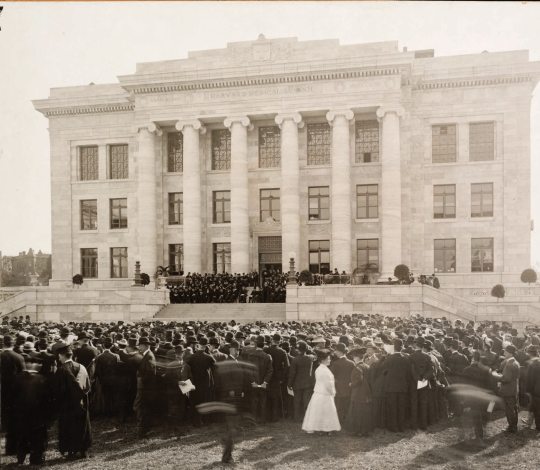 Hundreds celebrated the dedication of the HMS Quad on Longwood Avenue in 1906.
Hundreds celebrated the dedication of the HMS Quad on Longwood Avenue in 1906.
19,483: Estimated number of MD graduates since 1782
Questing for New Medicines
Basic science, clinical care: Bridging these realms is a top priority of my deanship. Translating laboratory findings into new therapies is difficult and expensive. But as the flow of new medicines slows to a trickle, a central goal for the School must be to engage more fully in developing new therapies while simultaneously supporting basic research. All HMS departments—basic science, clinical research, health policy, global health—have roles to play in the School’s translational mission.
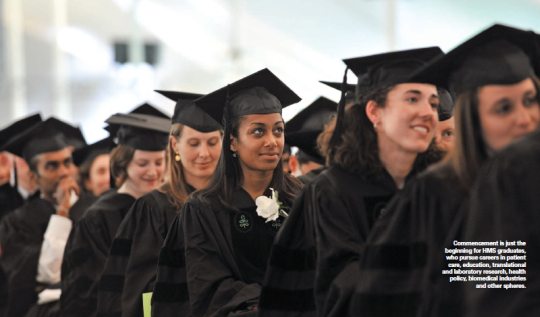 Commencement is just the beginning for HMS graduates, who pursue careers in patient care, education, translational and laboratory research, health policy, biomedical industries and other spheres.
Commencement is just the beginning for HMS graduates, who pursue careers in patient care, education, translational and laboratory research, health policy, biomedical industries and other spheres.
This year, we launched the HMS Program in Translational Science and Therapeutics, of which the first signature component is the Initiative in Systems Pharmacology. Typically formulated to impact one biological pathway or one molecular target, most potential drugs fail in people. But the emerging field of systems pharmacology strives to understand a drug’s effects on tissues, organs and cellular pathways within a living organism. The Initiative will draw together an unprecedented mix of cell biologists, geneticists, systems biologists, mathematicians, physicists, computer scientists and bioengineers to explore the precise impact of drugs on complex physiological networks long before they reach human trials.
Our Global Reach
With an inclusive diverse faculty and a student population that in 2011 represented eight countries, the HMS community embraces a world without borders. Leading the School’s outreach to world populations in desperate need of health care is the Department of Global Health and Social Medicine. This group promotes high-quality care through research and education, working in partnership with developing countries, our clinical affiliates and the nonprofit organization Partners in Health. In resource-poor settings, including Haiti, Rwanda, Bangladesh and Uganda, HMS students and residents develop culturally sensitive options for delivering care that will prevent needless deaths from diseases treated easily and cheaply elsewhere.
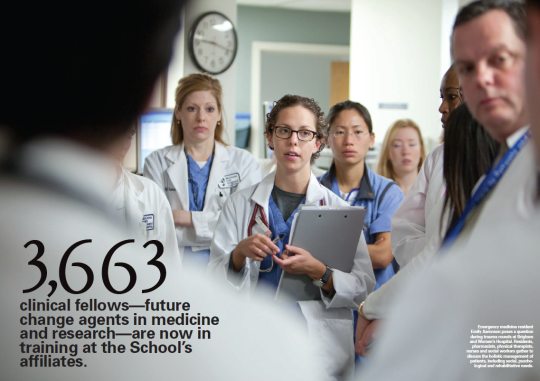 Emergency medicine resident Emily Aaronson poses a question during trauma rounds at Brigham and Women’s Hospital. Residents, pharmacists, physical therapists, nurses and social workers gather to discuss the holistic management of patients, including social, psychological and rehabilitative needs.
Emergency medicine resident Emily Aaronson poses a question during trauma rounds at Brigham and Women’s Hospital. Residents, pharmacists, physical therapists, nurses and social workers gather to discuss the holistic management of patients, including social, psychological and rehabilitative needs.
…
3,663: clinical fellows—future change agents in medicine and research—are now in training at the School’s affiliates
This year, Programs in Global Health and Social Change are exploring solutions for people living on less than $1 a day that are cost-effective, locally acceptable and scalable to thousands. Faculty concentrate in areas such as primary care, infectious disease, maternal and newborn health, surgery, non-communicable diseases and health systems, to name a few. Given advances in biomedicine and communication, we have the opportunity to save lives anywhere in the world.
Thanks to our success in securing research grants, generous philanthropic support and the careful stewardship of all funds, HMS rests on stable financial ground. However, given the financial challenges facing our country and the world, we continue to plan carefully, dedicated to ensuring that our first 230 years represent the dawn of Harvard Medical School’s service to society.
This report highlights just some of the past year’s achievements. Also featured are reminders of our venerable history of innovation: depictions of early explorers of science and the healing arts. Their milestones inspire us all as we look with excitement to the future.


…
Teaching and Learning
Schools across the U.S. look to HMS as a standard-bearer in medical education.
Essential to innovation in medical education at HMS is the process of evaluation—of what we do, how we do it and how best to make improvements. Anticipating a site visit last spring from the School’s accrediting body, the Liaison Committee on Medical Education (LCME), Dean for Medical Education Jules Dienstag, the Carl W. Walter Professor of Medicine, and other leaders in the Program in Medical Education (PME) led a comprehensive self-study involving broad participation by faculty, staff and students from the HMS Quad and our clinical affiliates. In November 2011, the LCME reaccredited the School, citing as particular strengths medical education reform and the Principal Clinical Experience, support for the faculty’s role in teaching, and the Dean’s strategic planning process. The entire HMS community shares credit for programmatic changes and innovations launched in the two-year period that culminated in this impressive outcome.
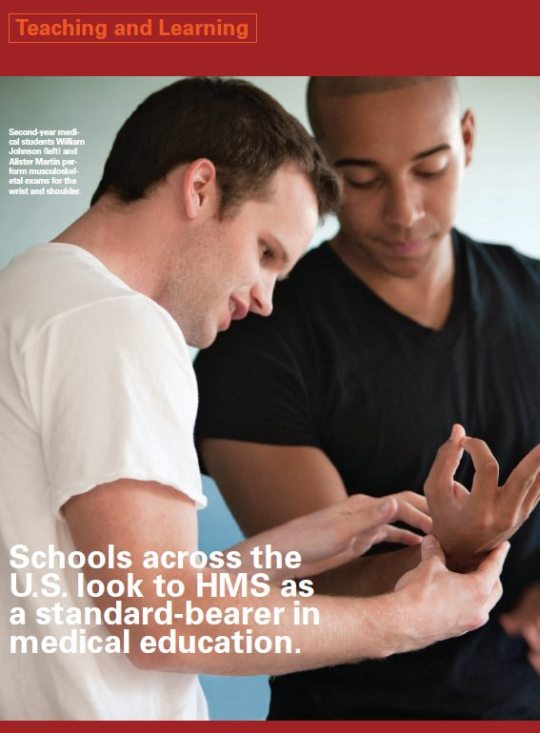 Second-year medical students William Johnson (left) and Alister Martin perform musculoskeletal exams for the wrist and shoulder.
Second-year medical students William Johnson (left) and Alister Martin perform musculoskeletal exams for the wrist and shoulder.
One result of the School’s continuous self-evaluation was the decision to begin building high-tech classrooms this summer, a recommendation of the Task Force on Classroom Learning. In 2010, the PME also established a Course and Clerkship Review and Evaluation Committee, composed of faculty members from wide-ranging disciplines who are reviewing the medical education curriculum from stem to stern.
Evaluation also is at the heart of two studies initiated by the HMS Center for Evaluation, directed by Edward Krupat, the principal investigator of both studies. The first, funded in 2011 by a grant from the National Institutes of Health (NIH), will illuminate factors associated with HMS students’ decisions to pursue careers in research, in particular those of underrepresented minority students. A second study aims to identify factors most closely associated with success and difficulties in medical school, with the aim of identifying markers of potential problems and addressing them proactively.
Every HMS Student a Scholar
In the belief that today’s students must not only master knowledge but also learn to create it, HMS in 2011 launched the Scholars in Medicine Program, beginning with the incoming class of 2015. This curricular addition, directed by Gordon Strewler, professor of medicine at Beth Israel Deaconess Medical Center and master of the Cannon Society, aims to spark curiosity and a love of discovery. Students will undertake projects that run the gamut of inquiry, from molecular biology to health care policy and the history of medicine. In year four, each will work with a senior faculty mentor and execute a written scholarly project. To date, 550 faculty have volunteered projects, and more than 70 faculty will serve as advisors, helping students identify and advance their projects to completion.
Center for Primary Care
Addressing the need to train high-caliber primary care physicians who will help lead the shaping of policies that will reform U.S. health care, within its first year the Center for Primary Care has begun attracting national attention and participation. The Center is ably led by three HMS faculty members serving as interim co-directors: Andrew Ellner and David Bates, of Brigham and Women’s Hospital, and Russell Phillips, of Beth Israel Deaconess Medical Center. This fall, an Innovation Fellows Program began supporting primary care faculty as they devote a year to research on care delivery, creating a community of clinician innovators, mentoring students and promoting cross-disciplinary collaborations.
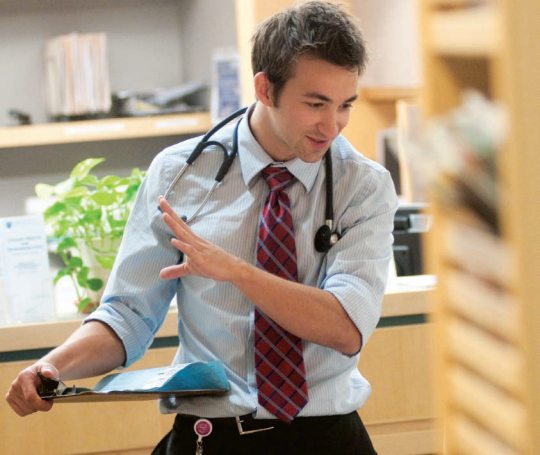 Stephen Pomedli, class of 2011, became interested in primary care at HMS and is now pursing a residency in family and community medicine at the University of Toronto.
Stephen Pomedli, class of 2011, became interested in primary care at HMS and is now pursing a residency in family and community medicine at the University of Toronto.
Teaching Clinical Skills: Seeking a Better Way
At HMS, students are introduced to patients in week one, then build clinical skills over four years. Mentoring is key to this process, and a new Task Force on Teaching Clinical Skills is working to ensure top-flight teaching at every level with the involvement of clinical faculty at the School’s affiliated hospitals and clinics. In year three, known as the Principal Clinical Experience (PCE), students train at a single hospital or health system, forging close ties with faculty, staff and patients. When the PCE was instituted in 2008, HMS launched quarterly Intersessions, bringing students engaged in the 12-month PCE back to the Quad to discuss health policy, delivery systems and medical ethics. These sessions provide resources for a faculty leader to oversee professional development across the four-year curriculum, beginning with the first course of medical school, “Introduction to the Profession,” and culminating in a new capstone course under development for graduating students and designed to facilitate their transition to postgraduate training.
Financial Aid Opens Doors
Many of our students, all of whom gain need-blind admission based on academic merit, require scholarships and loans to attend HMS. In academic year 2011-2012, about 84 percent will receive more than $31 million in such funding from institutional, federal and private sources; nearly $15 million of this support represents institutional scholarships bestowed by the School. HMS ranks among the top five U.S. medical schools for these awards. To lower the burden of debt that can steer students away from highly rewarding but less lucrative specialties, the School awarded $1.65 million through its loan-forgiveness programs to 2011 graduates, chiefly those pursuing careers in public service or, new this year, global health.
HMS Academy Hones Faculty Teaching Skills
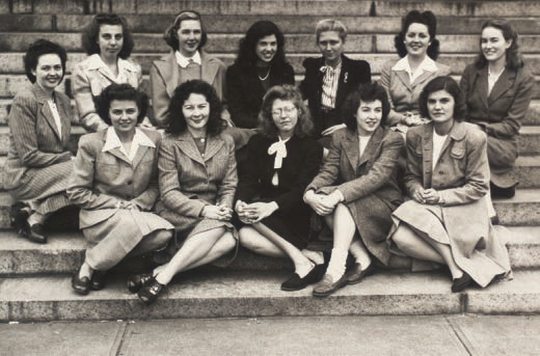 The first class of women admitted at Harvard Medical School in 1945.
The first class of women admitted at Harvard Medical School in 1945.
To help equip faculty with skills that bring out the best in medical students, the HMS Academy rolled out an array of new workshops and symposia this year. More than 540 faculty attended one or more sessions focused on teaching communication skills, evaluating learners’ clinical competencies, and understanding the neurobiology of stress and its impact on learning. The Academy also sponsored sessions concerning research on education and expanded the Harvard Inter-Hospital Education Collaborative, in which faculty from HMS-affiliated hospitals present their work in progress.
Spotlight on Graduate Education
Boot Camp for Graduate Students. To prepare incoming students to analyze experimental data, HMS in 2011 piloted a “Quantitative Science Boot Camp.” This four-day course covered quantitative tools used to answer research questions. The course complements the “Experimental Design Boot Camp,” which explains how to develop and test hypotheses. Helping design these courses are members of the Curriculum Fellows Program, a unique three-year certificate program that prepares PhD scientists to educate future teachers and administrative leaders in science. These initiatives are flagship efforts of the Longwood Program in Graduate Education, made up of the nine life-sciences graduate programs at HMS, the Harvard School of Public Health (HSPH) and the Harvard School of Dental Medicine (HSDM).
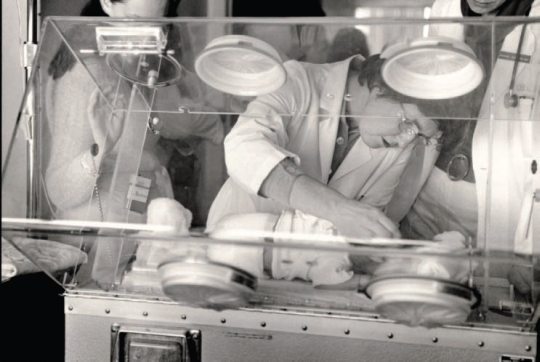 Mary Ellen Avery, Thomas Morgan Rotch Professor of Pediatrics, Emeritus, with a patient at Children’s Hospital Boston in 1959. Avery discovered that respiratory distress syndrome in premature infants arises from a lack of lung surfactant, a finding that led to a therapy that has since saved hundreds of thousands of lives.
Mary Ellen Avery, Thomas Morgan Rotch Professor of Pediatrics, Emeritus, with a patient at Children’s Hospital Boston in 1959. Avery discovered that respiratory distress syndrome in premature infants arises from a lack of lung surfactant, a finding that led to a therapy that has since saved hundreds of thousands of lives.
Bioinformatics and Integrated Genomics. This year, HMS Dean for Graduate Education David Golan and Associate Dean for Basic Graduate Studies David Cardozo laid the groundwork for ensuring the successful launch of the Bioinformatics and Integrated Genomics Program (BIG). This interdepartmental graduate program is now accepting applications for admission in fall 2012. Students will be co-admitted into BIG and a “home” PhD program, one of five which include systems biology and, within the Division of Medical Sciences, biological and biomedical sciences, neuroscience, immunology and virology.
Master of Medical Sciences in Global Health Delivery. A new master’s degree program in Global Health Delivery was approved in 2011. Upon its launch, expected in the coming year, the program will join existing programs in Bioinformatics, Scholars in Clinical Science and Clinical Investigator Training. With mentored research a major component, participants will study and develop interventions to improve health care delivery in resource-poor settings. Under development are master’s programs in bioethics and medical education.
International Partners. HMS and the Swiss university École Polytechnique Fédérale de Lausanne (EPFL), supported by the Bertarelli Foundation, have initiated the collaborative HMS–EPFL Program in Translational Neuro-science and Neuroengineering, a research and education initiative that aims to improve quality of life for people with neurological disabilities. In 2011, research projects began at both sites. Also this year, four EPFL master’s students came to HMS for translational studies in neuroscience and neuroengineering, focusing on projects such as the underlying mechanisms of, and treatment for, hearing loss. Collaborative exchange programs in Italy, Dubai and Portugal also continued to thrive.
Harvard Catalyst Postgraduate Education
One goal of Harvard Catalyst | The Harvard Clinical and Translational Science Center, directed by Lee Nadler—dean for clinical and translational research, and the Virginia and D.K. Ludwig Professor of Medicine—is to train physicians and scientists in the fundamentals of clinical and translational research.
Training Young Investigators. In the past two years, 750 MDs and PhDs have gravitated to courses offered by the Harvard Catalyst postgraduate education program, directed by Elliott Antman, associate dean for clinical and translational research and professor of medicine; James Ware serves as associate director and is also HSPH associate dean for clinical and translational science and the Frederick Mosteller Professor of Biostatistics. Postgraduate offerings include a one-week course, “Introduction to Clinical Investigation”; a two-week course, “Intensive Training in Translational Medicine”; and a new 40-week, free course in biostatistics fundamentals.
Expertise in Grant Writing. In 2011, Harvard Catalyst launched the Grant Review and Support Program, GRASP. This Harvard-wide initiative aims to transition junior faculty from NIH-funded K01 or K23 grants to research independence, supported by R01 grants. Led by Professor of Medicine Steven Freedman at Beth Israel Deaconess Medical Center, GRASP links rising scientists to senior advisors with K24 grants. Also offered is “Elements of Grant Writing.”
Continuing Medical Education
The Department of Continuing Education provides opportunities for health professionals to maintain skills, increase knowledge and competence, and improve performance. Faculty Dean for Continuing Education Sanjiv Chopra, HMS professor of medicine, stresses “the four Rs”: rigor—the highest standards of evidence-based teaching and innovation; reputation—that is, enhancing the School’s stature; reach—making instruction accessible and affordable; and research—ensuring that teaching methods help participants acquire knowledge and put it into practice. In fiscal year 2011, more than 76,000 physicians and other health professionals took advantage of more than 715 courses and conferences offered at HMS, affiliated hospitals and six partnering U.S. medical schools. More than 65 courses offered online drew over 41,000 participants from 171 countries. According to an online survey, more than 98 percent would recommend these courses to colleagues.


Research and Discovery
Harvard’s biomedical researchers devise leading-edge therapies and decipher the biological basis of life.
In 2011, thousands of discoveries sprang from the HMS Quad and affiliate laboratories. While all build on accumulated insights, many also represent seismic shifts in thinking.
For example, HMS researchers recently upended long-held assumptions about the structure of the prime protein culprit involved in Parkinson’s disease, a discovery likely to redirect efforts to slow or prevent neurodegeneration. Another team elucidated the molecular basis of innate mammalian behavior when they identified an olfactory chemical secreted by predators that triggers rodents’ instinctual flight. Also this year came the finding that stem cells in bone marrow can stimulate the heart to regenerate muscle following a heart attack. For more discoveries by HMS faculty, visitwww.focushms.com/category/research/
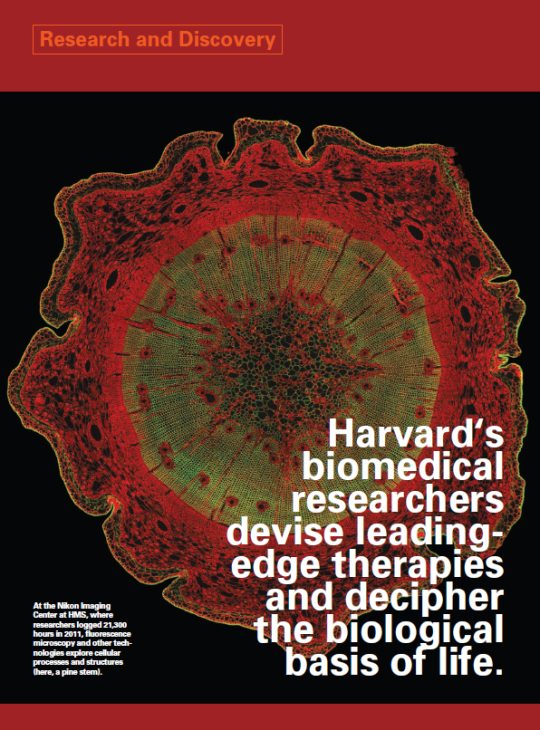 At the Nikon Imaging Center at HMS, where researchers logged 21,300 hours in 2011, fluorescence microscopy and other technologies explore cellular processes and structures (here, a pine stem).
At the Nikon Imaging Center at HMS, where researchers logged 21,300 hours in 2011, fluorescence microscopy and other technologies explore cellular processes and structures (here, a pine stem).
Our constellation of research institutions includes the Harvard Stem Cell Institute and the Broad Institute of MIT and Harvard, where many HMS faculty hold appointment; also the Wyss Institute for Biologically Inspired Engineering, where, for example, researchers have developed a nano-scale tool that builds complex structures from biomolecules at a rate 10,000 times faster than current methods and holds promise for treating and diagnosing disease.
Robust Federal Support
Under the direction of Executive Dean for Research William Chin, the Bertarelli Professor of Translational Medical Science and a leader in pharmaceutical discovery, the School’s research enterprise continues to flourish. The federal government is the primary and essential source of research dollars at HMS and its 17 affiliated hospitals and research institutes. Budgets, which continue to face pressure, are concentrated in translational research that moves laboratory findings into medical practice. HMS, where investigators are more successful than most in securing grants, is positioning programs to maximize government sponsorship in this arena while also turning to new non-federal sources.
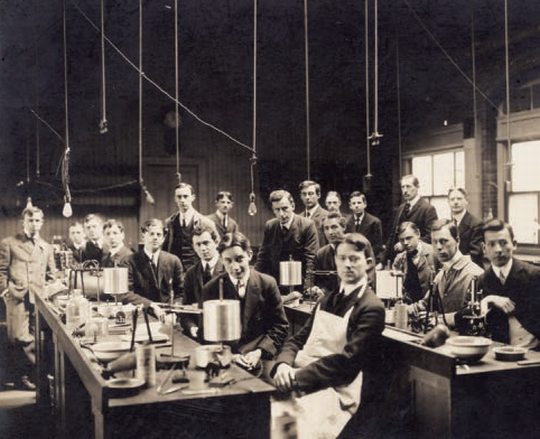
In 1899, guided by William Porter, HMS began requiring students to perform and discuss experiments in physiology. This new approach emphasized observation rather than didactic teaching alone.
In fiscal year 2011, HMS, including HSDM, headed by Dean Bruce Donoff, received $313.6 million in sponsored programs, 38 percent of Harvard University’s sponsored portfolio. National Institutes of Health grants totaled $266.5 million, with all federal awards reaching $276.3 million. American Recovery and Reinvestment Act (ARRA) funds, at $47.1 million, created 234 new jobs at HMS and collaborating Harvard schools.
Collaborating Across the Quad
July 2011 marked the launch of the new Department of Microbiology and Immunobiology, chaired by John Mekalanos, the Adele Lehman Professor of Microbiology and Molecular Genetics. This group brings together faculty who explore the biology of pathogenic viruses and bacteria (including the lethal strain of the cholera bacterium now devastating Haiti), microbial agents’ host organisms, the immune system, and their interactions during infection. A major goal of joining these infectious disease experts, pathologists, geneticists and surrounding clinical affiliate partners is to battle multidrug-resistant TB, HIV/AIDS, and other emerging diseases with antimicrobial drugs and vaccines. Integral to the department is the newly formed Division of Immunology, a unifying entity serving immunologists on the Quad.
Translational Science and Therapeutics
If the promise of personalized medicine is to be fulfilled, academe must play a larger role in therapeutic discovery by providing a deeper understanding of how the normal body works and the root causes of disease. Yet the number of new drugs is declining, even as the pharmaceutical industry struggles to serve the needs of patients who are divided increasingly into smaller, better-defined groups requiring discrete molecularly targeted therapies.
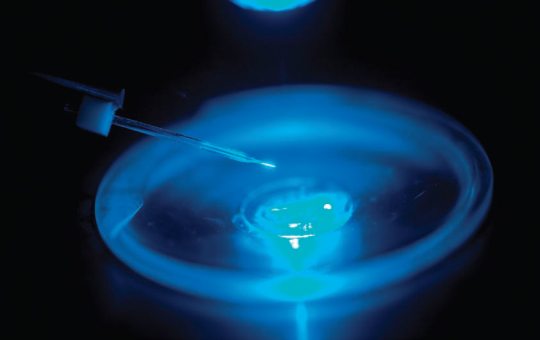 In the lab of HMS Professor of Neurobiology David Corey, a probe delivers movements of about a millionth of an inch to cells from the inner ear, mimicking sound vibrations.
In the lab of HMS Professor of Neurobiology David Corey, a probe delivers movements of about a millionth of an inch to cells from the inner ear, mimicking sound vibrations.
HMS can lead by opening doors to novel ways of tracing diseases to their origins—by identifying new biomarkers and developing new animal models, for example, and by maturing disciplines such as chemical biology and systems pharmacology. Announced this year, the Initiative in Systems Pharmacology, headed by Marc Kirschner, the John Franklin Enders University Professor of Systems Biology and chair of that department, will explore the complex interactions between new candidate drugs and living biological systems.
Federal regulatory agencies too must work with academe and industry to ensure public safety while encouraging innovation. To avoid potential conflicts of interest, HMS is completing the education and implementation phase of its revised Policy on Conflicts of Interest and Commitment, codified to ensure that our research activities meet the highest possible standards of integrity and transparency.
Immunology: Building on Strength
Harvard Immunology enters its second year leveraging the expertise of the University’s world-class immunologists. Within that effort, the Harvard Institute of Translational Immunology, HITI, targets immune-mediated diseases. In fiscal year 2011, HITI drew together a community of experts in immune and inflammatory systems, host defense, stem cell biology and tissue engineering. With funding from the Leona M. and Harry B. Helmsley Charitable Trust, HITI awarded more than a dozen competitive grants to teams focused on two autoimmune disease areas: Type 1 diabetes and Crohn’s disease. By forming new communities centered around specific diseases, HITI is fostering key collaborations and the sharing of patient samples.
Building Synergies
A model vehicle for encouraging collaboration among scientists in disparate fields, Harvard Catalyst continues in year four to advance translational and patient-based studies by fostering interactions among thousands of faculty across HMS, its affiliates and other Harvard schools, linking resources with researchers who have the imagination to ask the right questions.
One of the greatest challenges in clinical research is compiling large groups of patients who meet a certain set of criteria—for example, men over age 60 with stage 3 colon cancer in remission, taking certain medications and showing particular lab results. To compile a pool of de-identified patient data from multiple institutions, Harvard Catalyst developed the Shared Health Research Information Network, or SHRINE, a web-based search tool that enables investigators to search multiple hospital databases of clinical care information at the same time. Led by Isaac Kohane, the Lawrence J. Henderson Professor of Pediatrics, and directed by Douglas MacFadden, director of informatics technology, SHRINE networks are being used nationally. The Harvard network includes five affiliated hospitals.
Investigators in academe and industry are continually developing unique strains of microorganisms, animal models, laboratory equipment, reagents and other specialized resources. These valuable tools often are invisible to researchers elsewhere. To make them widely available for potential sharing, Harvard Catalyst formed the “eagle-i Consortium,” a group of nine U.S. universities that created an online database of all types of biomedical research resources searchable by scientists anywhere. Inventory will expand as other institutions join.
More than 1,100 investigators have enrolled in the Harvard Catalyst Clinical Research Center, which in academic year 2011 encompassed more than 30,000 patient visits at five sites. Directed by Anne Klibanski, associate dean for clinical and translational research and the Laurie Carrol Guthart Professor of Medicine, the program makes available to all clinical investigators services in research nursing, nutrition and protocol development. A single online system streamlines the protocol review process. A centralized laboratory reduces costs, and a microgrant program in 2011 awarded up to $5,000 to 20 junior investigators for tests needed for their studies.
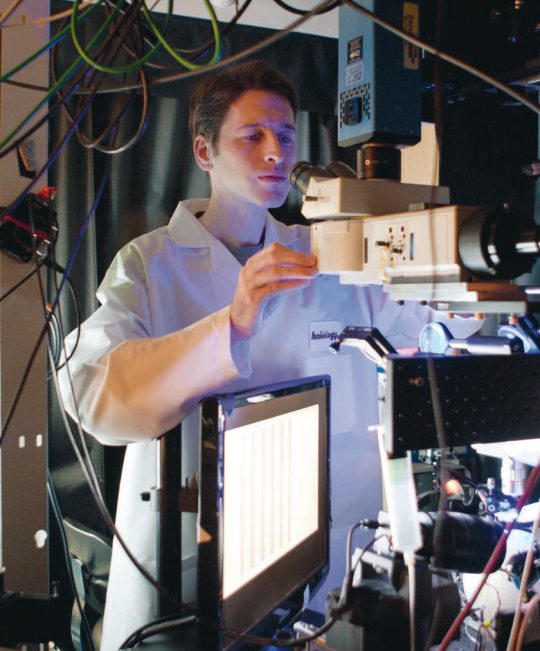 In Professor of Neurobiology Clay Reid’s lab, postdoc Mark Andermann uses fluorescence microscopy to monitor changes in individual neurons in the brain’s visual cortex. He aims to cast light on how neurons’ responses are affected during learning in models of diseases such as Alzheimer’s.
In Professor of Neurobiology Clay Reid’s lab, postdoc Mark Andermann uses fluorescence microscopy to monitor changes in individual neurons in the brain’s visual cortex. He aims to cast light on how neurons’ responses are affected during learning in models of diseases such as Alzheimer’s.
…
5,204: Estimated total postdoctoral fellows at HMS and affiliates
Through the Community Health Innovation and Research Program, known as CHIRP, Harvard Catalyst engages with both the state and community partners. Faculty and students work to translate scientific evidence into effective health policies through research and training activities. With the Massachusetts Department of Public Health, for example, in 2010 CHIRP analyzed the impact of restricting sales of snack foods and soda in schools as well as barriers to such restrictions, and is now evaluating new state regulations on competitive food sales. CHIRP also is helping community health centers become more fully engaged in research and in translating evidence into practice; a community advisory board has been pivotal in providing direction. Several planning grants have been funded with community partners, including grants to improve access to care. For maximum translational impact, a key goal is to increase coordination among all stakeholders—community groups, health care systems and policymakers.
Accelerating Impact
To translate discoveries forged at the research bench into solutions for intractable medical problems, Harvard’s Office of Technology Development speeds the development of tools, assays, equipment and therapies in three ways: by protecting intellectual property; by fostering creative alliances with strong industry collaborators through sponsored research agreements and licensing transactions for new inventions; and by providing competitive grants for proof-of-concept studies through the Accelerator Fund. For more information and examples of licensed products, visit otd.harvard.edu


Harvard Office of Technology Development: Linking Science and Business to Advance
Human Health
Throughout HMS, our investigators are making translational discoveries at an unprecedented rate, discoveries that are driving the development of next-generation technologies and overall progress in clinical medicine. HMS is determined to hasten the translation of new discoveries forged on the research bench into new solutions for previously intractable medical problems. Harvard’s Office of Technology Development (OTD) builds added value around, and speeds the development of such discoveries in three fundamental ways: by protecting intellectual property, by fostering creative alliances with strong industry collaborators through sponsored research agreements and licensing transactions covering new inventions, and through an innovative gap-funding program, known as the Accelerator Fund, that provides competitive grants supporting proof-of-concept studies to advance new inventions from the discovery stage to licensing and commercial development.
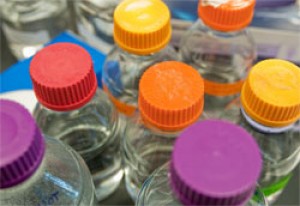
The Harvard Office of Technology Development
links science and business to advance human health.
Increasingly, the pace of innovation and translation at Harvard is hastened through sponsored research agreements with industrial partners, and through new innovative efforts to position our research results for licensing or additional funding (see Accelerator Fund, below). HMS faculty can benefit from research collaborations with industry and welcomes the intellectual cross-fertilization that can result. Spurred by the opportunity to leverage HMS’s research excellence through high-value alliances with strong partners, collaborations with industry can inform both discovery and translation, helping to bridge the gap between lab and clinic. Technology transfer and partnering with industry enhance the ability of HMS to promote the public interest while carrying out its academic and research missions.
The Technology Development Accelerator Fund is an innovative “gap funding” program that awards grants on a competitive basis to support essential proof-of-concept research aimed at progressing new inventions from the discovery stage through to licensing and, ultimately, commercial development. The Accelerator is vital to OTD’s strategy of adding value to early-stage research projects, then vaulting them toward the “lift-off” point where they become attractive candidates for industry partnerships.
Now in its fifth year, the Accelerator Fund provides bridge financing to enable validation and feasibility studies—the kind of research necessary for attracting investment by industrial partners. For example, in 2011, a new HMS research program, led by HMS Professor of Cell Biology Junying Yuan was selected for funding by the Accelerator. The program focuses on the development of small-molecule inhibitors, dubbed necrostatins, to target a new mechanism of cell death discovered in the Yuan lab, with the hope of treating multiple disease types, including inflammatory and autoimmune diseases, as well as neurodegenerative conditions.
This year also marks the successful partnering with industry of three recent graduates of the Accelerator program, achieved through Accelerator-supported research and close collaboration between the principal investigators and OTD:
– Novel Platform for the Treatment of Autoimmune Diseases. Ulrich von Andrian, the Edward Mallinckrodt Jr. Professor of Immunopathology at HMS, and his colleagues have developed an entirely new technology for the induction of antigen-specific tolerance. Their approach holds promise to treat and cure such autoimmune diseases as multiple sclerosis and Type 1 diabetes. OTD structured and concluded an exclusive agreement with Selecta Biosciences, which will provide for significant investment by Selecta in the development of this technology for clinical and commercial application.
– Small-molecule inhibitors of the deubiquitinating enzymes Usp14 and Uch37. In Cell Biology, Professor Dan Finley and Associate Professor Randall King have developed novel technologies for enhancing the activity of a key cellular protein-clearance mechanism, the ubiquitin-proteasome pathway. These technologies may enable the development of new therapeutics for neurodegenerative diseases, such as Alzheimer’s, Parkinson’s and Huntington’s, as well as orphan diseases such as cystic fibrosis and lysosomal storage diseases. OTD has concluded a license agreement that grants rights to these technologies with Proteostasis, a biotechnology company active in the field of protein homeostasis.
– Small-molecule inhibitors of autophagy for the treatment of cancer.Autophagy is a process of self-digestion through which cells recycle their intracellular constituents in an attempt to survive exposure to external stresses. Transient inhibition of autophagy has been proposed as a therapeutic strategy to sensitize cancer cells to radiation and chemotherapy. The Accelerator Fund provided support to Professor of Cell Biology Junying Yuan in her efforts to develop a new class of novel potent small-molecule inhibitors of autophagy targeting a broad range of cancer types. This program was partnered with Hoffman La Roche, a large pharmaceutical company. The development of this technology will involve collaboration in research between the Yuan lab and the company.
“The Accelerator Fund is a wonderful invention—it works extremely well. In our case, it allowed us to take a good early-stage project and get to a stage at which the project could be licensed to a strong biotech partner. The program is structured along many lines to provide successful outcomes, but, in my opinion, its strongest asset is effective leadership. A project at this stage, about to move from academics to academic-industry partnership, presents you with a network of fateful decisions. The drug development experience at the heart of the program provides advice that can be hard or impossible to get otherwise for academics, even those that have ‘been around the block.”
—Dan Finley, Professor of Cell Biology, HMS
Finally, 2011 was also notable for the significant expansion of strategic research collaborations between HMS investigators and industry. In an effort to foster and advance promising translational research, OTD nucleates and structures innovative approaches to maximize collaboration opportunities with HMS investigators and commercialization opportunities relating to technologies developed in HMS Labs.
As a result, multiple new research alliances spanning multiple scientific projects in multiple laboratories across campus were brought to conclusion this year. Notable among these are collaborative research agreements with such companies as Hoffman La Roche, Sanofi-aventis, Pfizer, UCB and Boehringer-Ingelheim. Such multi-year, multi-million dollar agreements are designed to fund high-impact, investigator-initiated translational research projects through competitive RFP-based grant programs. As a result of these alliances, more than 20 new HMS investigators and research projects enjoy funding aimed at enabling discovery and innovation that may give rise to the development of new therapies, thereby impacting the practice of clinical medicine and improving patient care.


Leaders and Innovators
HMS is a global center of creativity and innovation where faculty push the boundaries of their disciplines in labs, classrooms and the field.
An outstanding faculty of nearly 11,900 on the HMS campus and its 17 affiliated institutions must be nurtured and supported as they strive to test ideas through experimentation and pass their knowledge to generations of students. Overseeing this effort is Dean for Academic and Clinical Affairs Nancy Tarbell, the C.C. Wang Professor of Radiation Oncology, herself a physician and champion of faculty development, including mentoring of women, minorities and of junior faculty and the expansion of professional opportunities for faculty at every rank.
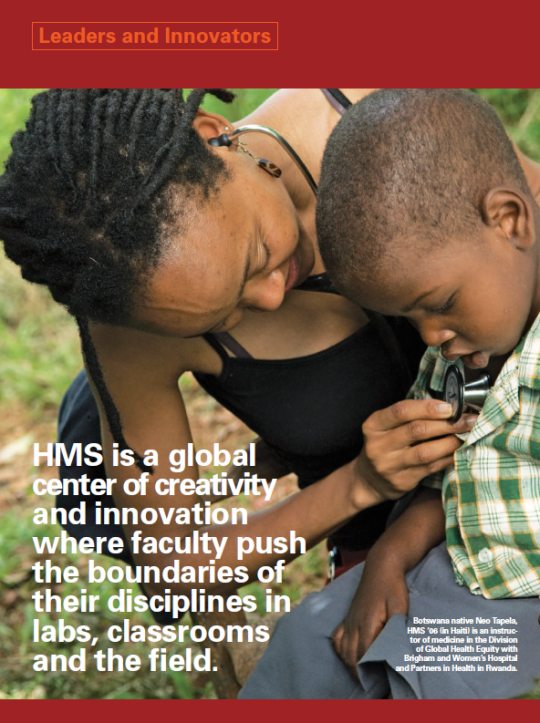 Botswana native Neo Tapela, HMS ’06 (in Haiti) is an instructor of medicine in the Division of Global Health Equity with Brigham and Women’s Hospital and Partners in Health in Rwanda.
Botswana native Neo Tapela, HMS ’06 (in Haiti) is an instructor of medicine in the Division of Global Health Equity with Brigham and Women’s Hospital and Partners in Health in Rwanda.
Recruitment and Promotion
At HMS, recruiting and retaining the best faculty are paramount goals. In 2011, under the leadership of Dean for Faculty Affairs Maureen Connelly, HMS made notable strides in faculty recruitment, retention and career advancement.
Expediting Promotions. Among priorities in academic year 2010-2011 was streamlining the faculty promotions process while maintaining rigorous evaluation standards. The new, expedited process consolidates steps formerly taking place at HMS and the hospitals into a single, transparent and more efficient model. The average length of evaluation is now less than one year. Faculty promotions increased 28 percent over the previous year, while promotions to the rank of professor rose by 43 percent. Promotion committees now use a paperless system, and faculty members can monitor the progress of their evaluation on a secure website. Encouraged to think beyond traditional definitions as to what constitutes top scholarship, faculty may submit, in addition to peer-reviewed publications, materials such as course syllabi, nationally adopted guidelines for patient care, and novel methods or technologies that have had major, demonstrable impact.
Commitment to Diversity. In 2011, the number of women professors at HMS increased to 150; 16 percent of the senior faculty are now female. Minority faculty now constitute 5 percent of all faculty and nearly 5 percent of promotions at every rank including that of professor. The second and third African American women ever appointed HMS professors were promoted in this academic year.
Searches, Recruits, Orientation. To expedite searches for senior faculty, HMS and its affiliates now fluidly share information among the Dean’s Office, department leaders and governing boards. In 2011, the faculties of Medicine and Arts and Sciences welcomed to Global Health and Social Medicine David Jones ’01, the first A. Bernard Ackerman Professor of the Culture of Medicine and an expert on the history of health inequities. The School’s recruitment efforts also have successfully attracted several outstanding junior faculty, with invitations accepted by scholars at the top of their fields to join the departments of Genetics, Health Care Policy and Neurobiology. Common review standards are being fine-tuned for appointing junior faculty, who are welcomed to HMS through orientation events at which they hear from Dean Jeffrey S. Flier, senior administrators and panels of senior faculty, and discover an array of career resources.
Fostering Diversity Inclusion
Poor health outcomes for African Americans, Hispanic Americans, American Indians and Alaska Natives, Asian Americans, Native Hawaiians and Pacific Islanders are apparent when their health indicators are compared with the rest of the U.S. population. These populations experience higher rates of illness and death related to health conditions such as heart disease, stroke, specific cancers, diabetes, HIV/AIDS, asthma, hepatitis B and obesity. To elevate the quality of care available to minority, disadvantaged and underserved populations, the HMS Office for Diversity Inclusion and Community Partnership (DCP), headed by Dean Joan Reede, associate professor of medicine, engages in a range of minority health fellowship programs that provide advanced training to physicians.
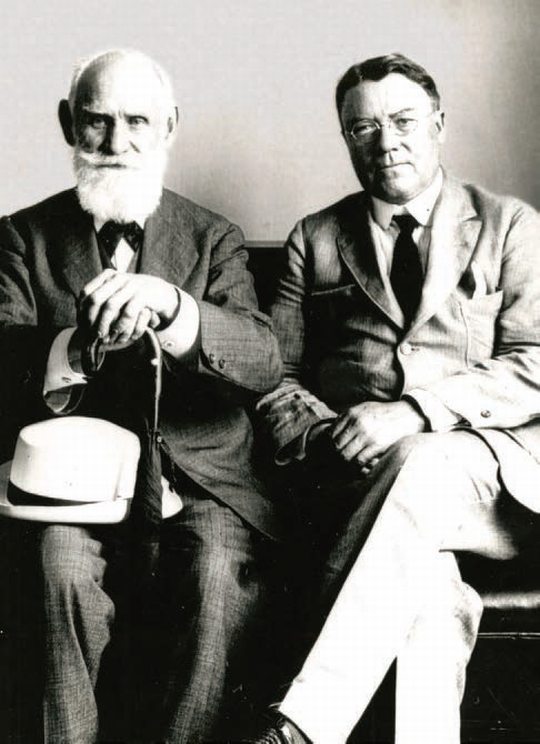
Walter Bradford Cannon (right), George Higginson Professor of Physiology at HMS, with acclaimed physiologist Ivan Pavlov in 1923. Each made key discoveries about the association between emotions, psychology and physiology.
Between 1996 and 2012, nearly 100 participants have achieved professional success: currently 53 percent hold positions at academic institutions; 25 percent work the public sector; and 22 percent hold private-sector posts. Collectively they advance health policy, public health, and minority health research and health care delivery. More than 86 percent serve on national, state and local committees and advisory boards; 64 percent have published scholarly works; and 71 percent have held academic appointments at schools of public health and medicine. Fifteen alumni are now at HMS as associate or assistant professors or instructors.
The Commonwealth Fund Harvard University Fellowship in Minority Health Policy (CFHUF). Celebrating its 15th year in 2011, this degree-granting fellowship, supported by the Commonwealth Fund, prepares physicians to expand access to high-quality care for minority and other vulnerable populations. The yearlong opportunity comes under the direction of DCP’s Minority Faculty Development Program at HMS in collaboration with HSPH and the Harvard Kennedy School. Among many distinguished alumni is Roderick King, a 1998 fellow, now an instructor in social medicine at HMS and senior faculty member at the Disparities Solutions Center at Massachusetts General Hospital, who as a 2011-2012 Fulbright NEXUS Scholar is guiding a project aimed at developing leaders to improve the health of Caribbean populations.
Joseph L. Henry Oral Health Fellowship in Minority Health Policy. Marking its sixth year at HMS, this degree-granting program, supported by the Dental Service of Massachusetts/Delta Dental Plan, is named for a revered professor emeritus at HSDM who died in 2011. The program cultivates leaders in minority oral health determined to enlarge the health system’s capacity to address special needs of minority and disadvantaged populations. Brian Swann, a 2008 fellow, is currently the chief of dental services at Cambridge Health Alliance and clinical instructor in oral health policy and epidemiology at HSDM.
Center of Excellence in Minority Health and Health Disparities. Building on existing educational programs at HMS, this virtual center works to enhance the academic performance of underrepresented minority students, who make up 19 percent of the 2011 entering class. Cultural competence training for faculty, residents and students is a theme, as is faculty development and research focusing on health disparities such as postpartum depression-associated child health outcomes, with a focus specifically on sociodemographic and stressor variables across women by race and ethnicity and a study of the spread of medical mistrust and inaccurate health information in the social networks of African Americans with HIV.
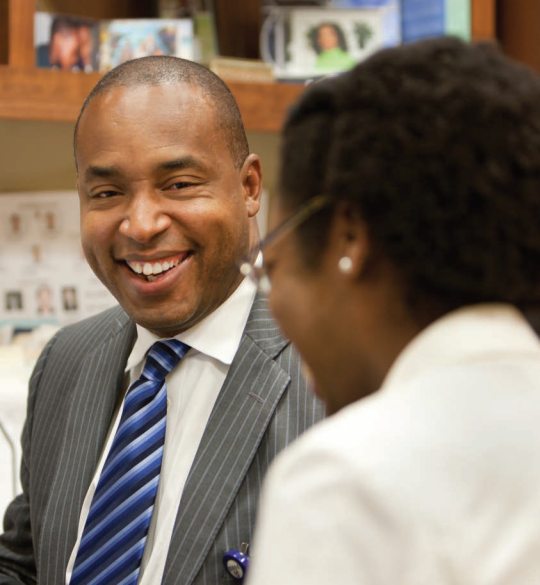 Selwyn Rogers with fourth-year student Bethany Strong. Rogers, an HMS Faculty Fellow funded by the Center of Excellence in Minority Health and Health Disparities from 2003 to 2005, is an associate professor of surgery and division chief for Trauma, Burns and Surgical Critical Care at Brigham and Women’s Hospital. His research focuses on improving care quality for minority populations.
Selwyn Rogers with fourth-year student Bethany Strong. Rogers, an HMS Faculty Fellow funded by the Center of Excellence in Minority Health and Health Disparities from 2003 to 2005, is an associate professor of surgery and division chief for Trauma, Burns and Surgical Critical Care at Brigham and Women’s Hospital. His research focuses on improving care quality for minority populations.
Harvard Catalyst Faculty Fellowship.This two-year, non-degree fellowship frees junior faculty from clinical and teaching demands at a key point in their careers, allowing them to conduct translational research. Appointed to this fellowship in 2010 is neonatologist Camilia Martin, assistant professor of pediatrics at Beth Israel Deaconess Medical Center. Martin was featured in an article in the Oct. 24, 2011, issue ofThe New Yorker, “A Child in Time: New Frontiers in Treating Premature Babies,” that describes how physicians now save many infants born in a perilous state.
Office for Diversity Inclusion and Community Partnership Faculty Fellowship.This two-year, non-degree fellowship, sponsored in partnership with HMS-affiliated hospitals and the Provost’s Office at Harvard, enables HMS junior faculty to pursue activities that promote their professional development. Francisco Quintana, assistant professor of neurology at Brigham and Women’s Hospital, who is completing his second fellowship year, has identified a potential therapeutic target for the modulation of the immune response in human autoimmune disease through a recently awarded R01 grant from the National Institute of Allergy and Infectious Diseases.


Awards and Honors
In addition to the HMS faculty cited below, hundreds more are honored annually by professional societies, institutions, communities and governments worldwide.
Two HMS Faculty Named University Professors
The Harvard University Professorship, established in 1935, recognizes individuals working on the frontiers of knowledge in ways that span traditional boundaries between academic disciplines. This past year, two HMS faculty members received this distinction, joining Marc Kirschner, the John Franklin Enders University Professor of Systems Biology and chair of that department, in holding this highest faculty honor, of which there are only 25.
Paul Farmer, chair of the HMS Department of Global Health and Social Medicine and co-founder of Partners In Health, is the first Kolokotrones University Professor. Farmer, a physician-anthropologist, has revolutionized community-based strategies for treating infectious diseases in developing countries, champions health as a human right, and studies the role of social inequalities in determining disease distribution and outcomes.
Douglas Melton, co-chair of Stem Cell and Regenerative Biology (SCRB), a department administered by HMS and the Faculty of Arts and Sciences (FAS), is the Xander University Professor. Melton, also the Thomas Dudley Cabot Professor of the Natural Sciences, has been a driving force behind Harvard’s ascendancy in stem cell research and co-chairs the Harvard Stem Cell Institute.
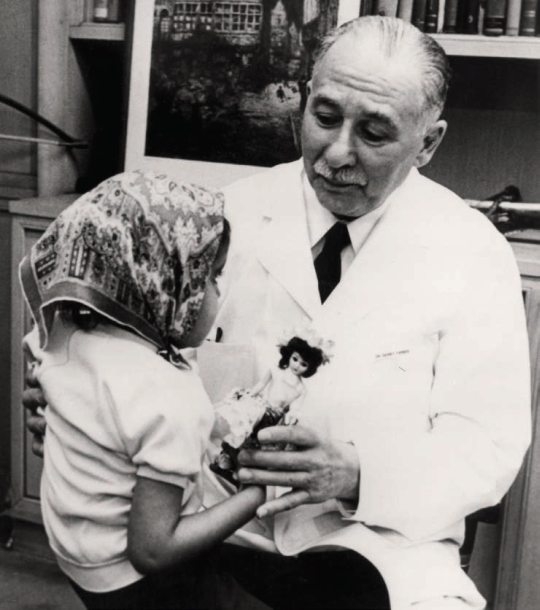 In 1960, Sidney Farber showed for the first time that a drug could combat childhood leukemias and other non-solid tumors. Farber founded the Children’s Cancer Research Foundation, forerunner of Dana-Farber Cancer Institute.
In 1960, Sidney Farber showed for the first time that a drug could combat childhood leukemias and other non-solid tumors. Farber founded the Children’s Cancer Research Foundation, forerunner of Dana-Farber Cancer Institute.
Gary Ruvkun Receives 2011 Dan David Prize
This international $1 million award, endowed by the Dan David Foundation at Tel Aviv University, was awarded to Gary Ruvkun, HMS professor of genetics in the Department of Molecular Biology at Massachusetts General Hospital. The prize recognizes innovative research that cuts across traditional paradigms. Having worked to define the genetic basis of aging, Ruvkun has discovered in animal models a set of hormonal signals and pathways that regulate aging and lifespan.
Matthew Nock Named MacArthur Fellow
Matthew Nock, a professor of psychology at FAS who studies suicide and self-injury in adolescents and adults, received a $500,000 “genius” grant from the John D. and Catherine T. MacArthur Foundation. In a study supported by Harvard Catalyst, Nock collaborated with the Mass General inpatient psychiatric unit. By combining epidemiology, lab experiments, mental health associations and biological and psychological assessments, he is making breakthroughs in predicting and preventing suicide.
Alpert Prize Honors Bioengineering Luminaries
Created to reward scientists whose discoveries have made great progress in new therapies for a wide range of diseases, in 2011 the Warren Alpert Prize was awarded to a basic scientist and a clinician, both pioneers in bioengineering. HMS Dean Jeffrey S. Flier chairs the Alpert Foundation’s scientific advisory committee, which selects recipients of this prestigious award.
Robert Langer, senior lecturer on surgery at HMS and the David H. Koch Institute Professor at MIT, is known for advancing drug delivery and tissue engineering. He has developed polymers to deliver drugs at controlled rates and has engineered blood vessels and vascularized skeletal muscle tissue. The world’s most cited engineer, Langer holds more than 800 granted or pending patents.
Alain Carpentier, head of the Department of Cardiovascular Surgery at the Hôpital Européen Georges-Pompidou in Paris, is recognized for developing and implanting the first successful artificial bronchus, saving the lung of a patient with cancer. He also developed the first artificial valve for patients using animal tissues processed to prevent immunological reaction and is a lead developer of a fully implantable artificial heart soon to enter clinical trials.
Rolf Luft Award to Jeffrey Flier
The 2011 Rolf Luft Award was awarded to HMS Dean Jeffrey S. Flier by the Karolinska Institute for his seminal contributions to understanding the physiology of insulin and leptin, and the mechanisms underlying defective actions of these hormones in metabolic diseases.
Eight Named to Institute of Medicine
In recognition of exceptional scientific achievement and commitment to service, eight faculty members were among 65 named in 2011 to the Institute of Medicine, the health arm of the National Academy of Sciences.
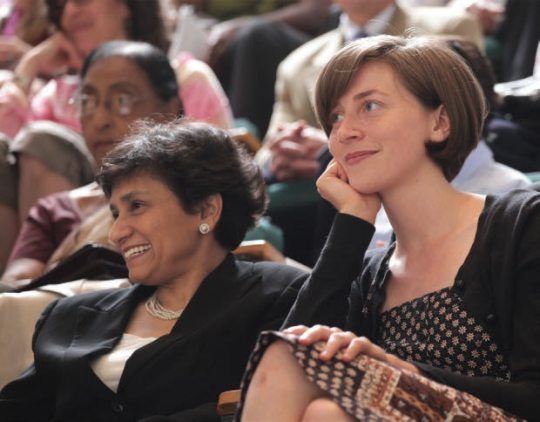 Arundhati Ghosh, HMS instructor in surgery at Cambridge Health Alliance, with mentee Vanessa Reddit, who nominated Ghosh for her 2011 Young Mentor Award.
Arundhati Ghosh, HMS instructor in surgery at Cambridge Health Alliance, with mentee Vanessa Reddit, who nominated Ghosh for her 2011 Young Mentor Award.
…
11,860: Total faculty on the HMS campus and affiliates
Margarita Alegria, HMS professor of psychology in the Department of Psychiatry, directs the Center for Multicultural Mental Health Research at Cambridge Health Alliance. An expert on disparities in mental health and substance abuse services for minority populations and leader of the National Latino and Asian American Study, she aims to improve service access, equity and quality for disadvantaged populations.
Frederick Alt is HMS professor of genetics and the Charles A. Janeway Professor of Pediatrics at Children’s Hospital Boston. He is also president of the Immune Disease Institute and director of its Program in Cellular and Molecular Medicine. The Alt lab is elucidating mechanisms that maintain genomic stability in mammalian cells, specifically B and T lymphocytes.
George Daley, HMS professor of biological chemistry, molecular pharmacology and pediatrics, is the Samuel E. Lux IV Professor of Hematology/Oncology at Children’s. Daley, a pioneer in stem cell research, is known for his work in chronic myeloid leukemia, caused by genetically defective stem cells, and in somatic cell reprogramming to model human disease. He aims to translate insights in stem cell biology into cellular therapies for degenerative, malignant and genetic diseases.
Atul Gawande, associate professor of surgery at Brigham and Women’s and of health policy and management at HSPH, is devising clinical-system innovations to improve patient outcomes, such as the World Health Organization Safe Surgery Checklist. He is developing a safe-childbirth checklist and studying low-cost pulse oximetry in developing countries. He also directs the Risk Management Foundation/Harvard Surgical Chiefs Patient Safety Collaborative.
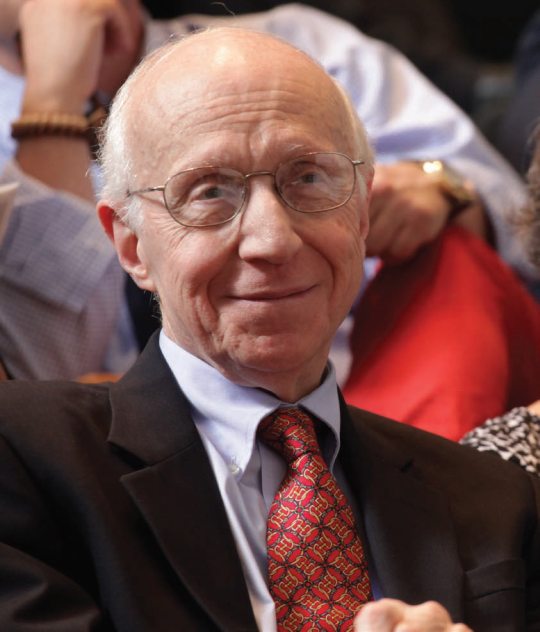 Richard Grand, professor of pediatrics at Children’s Hospital Boston, was among four who received the William Silen Lifetime Achievement in Mentoring Award in 2011.
Richard Grand, professor of pediatrics at Children’s Hospital Boston, was among four who received the William Silen Lifetime Achievement in Mentoring Award in 2011.
Sharon Inouye, HMS professor of medicine, is a member of the Division of Gerontology at Beth Israel Deaconess Medical Center and director of the Aging Brain Center in the Institute for Aging Research at Hebrew SeniorLife. Her studies of delirium in the elderly have influenced hospital care worldwide. She leads the Successful Aging after Elective Surgery (SAGES) study.
Jay Loeffler, the Herman and Joan Suit Professor of Radiation Oncology, is chief of the Department of Radiation Oncology at Mass General. Specializing in neuro-oncology, Loeffler has devoted his career to pioneering radiation delivery techniques, including improvements in stereotactic radiosurgery and proton therapy, to target and destroy primary and secondary malignant brain tumors as well as a wide variety of benign tumors.
JoAnn Manson, the Michael and Lee Bell Professor of Women’s Health at HMS, professor of epidemiology at HSPH, and chief of preventive medicine at Brigham and Women’s, leads high-impact randomized clinical trials and translational research on the prevention of cardiovascular disease, diabetes and cancer in women, including the Women’s Health Initiative, Nurses’ Health Study, the Women’s Folic Acid Study, and the new VITamin D and OmegA-3 TriaL (VITAL).
James Thrall, the Juan M. Taveras Professor of Radiology and head of the Department of Radiology at Mass General, is an expert in nuclear medicine and nuclear radiology, with clinical interests in nuclear cardiology, positron emission tomography scanning and skeletal scintigraphy. He oversees the Massachusetts General Hospital Imaging Center.
For a more comprehensive but by no means exhaustive list of faculty honors and awards, visit www.focushms.com


###
* The above information is adapted from materials provided by Harvard University
_________________________________________________________________


